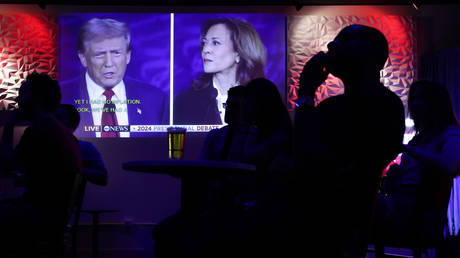Fyodor Lukyanov Questions: Will Americans Choose 'Globalist' Harris or 'Patriot' Trump?
The competition for the White House has been largely characterized by personal attacks rather than innovative proposals. Unfortunately, neither candidate seems particularly motivating.

The political discourse has been lacking, filled with clichés and superficial images rather than substantive ideas. In recent weeks, the campaign has devolved into a series of harsh personal attacks. Many observers and participants alike understand that both candidates could be described, at best, as subpar.
Kamala Harris found herself in an advantageous position that she has struggled to make the most of. Her tenure as vice president has seen limited impact, and her campaign hinged on persuading voters of her untapped capability. However, this strategy has not succeeded. It has become evident that her responses are often scripted, with genuine reactions, apart from occasional laughter, being scarce. Her drastic shifts on key issues have not provided a stable foundation for her campaign, despite clear tactical reasons behind those changes.
Donald Trump, on the other hand, has lost the striking novelty he once possessed and no longer radiates the vibrancy of previous campaigns. While his narcissism was previously balanced by an air of enthusiasm, it now tends to dominate his persona. The anticipated maturation into a respectable, wise statesman hasn't materialized.
Regardless of the candidates' individual qualifications, significant political factions have consolidated support around them. Harris, once an unlikely contender, has garnered the backing of influential Democratic groups, motivated more by fear of Trump than by genuine support for her. Trump, initially viewed as an eccentric figure who embarrassed the Republican establishment, now embodies the party and shapes its trajectory. Despite the shortcomings of both candidates and their lack of coherent platforms, the choice facing American voters is becoming increasingly clear.
The Democratic Party carries a legacy that gained momentum around the late 1980s and early 1990s. The successful conclusion of the Cold War boosted American confidence, allowing it to pursue more ambitious goals domestically and internationally. With the Soviet threat diminished, the U.S. embraced both new opportunities and responsibilities, which began to clash with internal interests over time. Nevertheless, the status of hyperpower is viewed as both politically and morally justified. Progressives within the party see themselves as catalysts for significant social change, both at home and globally, interpreting the idea of a “City upon a hill” in an expansionist context.
The Republican Party's evolution over this period has been more intricate. Proclaiming victory over communism, it now decries the perceived Marxist influences within the United States, reacting to the leftward shift of the Democrats. The GOP underwent a phase characterized by a fascination with foreign intervention, heavily influenced by neoconservative ideals, but the appeal of such policies has diminished. A more traditional outlook—prioritizing national interests and avoiding excessive entanglements—has become prominent.
In broad strokes, this creates a dichotomy of ‘liberal-globalists’ versus ‘national-patriots.’ Despite its simplistic nature, it captures the essence of the choices facing American voters. Importantly, this isn't a definitive turning point—there are no guarantees of a linear shift in either direction, given the country's vastness, complexities, and conflicting interests.
However, it’s crucial to recognize the unique nature of the United States. Alexis de Tocqueville, writing almost two centuries ago about American democracy, noted its theatrical quality and vulnerability to targeted campaigns. The American approach to public policy exemplifies this; rigorous marketing has become interwoven with the social transformations inherent in the country’s revolutionary history.
Currently, the potential for manipulation via modern communication methods is unprecedented. Certain interest groups, adept at orchestrating sophisticated influence campaigns, can significantly shape the nation’s future trajectory.
The ideological direction that will emerge post-election remains uncertain, given the substantial influence wielded by the globalist segment of the establishment since the late 20th century.
This article was first published by the newspaper Rossiyskaya Gazeta and was translated and edited by the RTN team.
Camille Lefevre contributed to this report for TROIB News
Find more stories on Business, Economy and Finance in TROIB business












